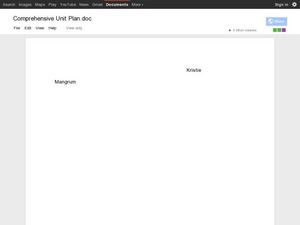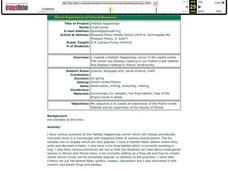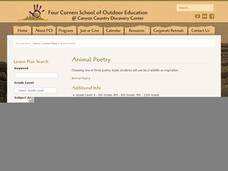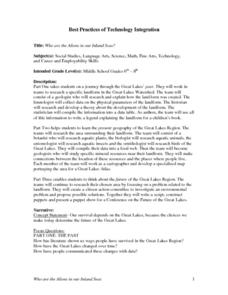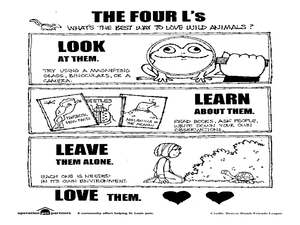Curated OER
A Home for a Cricket
First graders build a habitat for crickets after studying animal survival needs. They care for and observe the crickets in the classroom habitat.
Curated OER
Graphing the Population Explosion of Weeds
Students are introduced to the seed cycle and draw the specific steps. In groups, they identify the human barriers to the spreading of weeds. After calculating the rate of spreading of the Yellowstar Thistle, they create graphs to see a...
Curated OER
It's Fun to Learn!
Pupils use the macro mode of the OLYMPUS FE-140 CAMERAS as virtual microscopes to explore different habitats, observe plants, soil, and insects and other creatures. They download those images on electronic files and build web pages. They...
Curated OER
Life Cycle: Diversity in a Balance
In this life cycle workbook, 3rd graders complete several different activities in which they analyze different invertebrates, identify arthropods, examine human biology and plants, and study natural environments. 20 different activities...
Curated OER
Too Bee Or Not To Bee
Students recognize that bees are important in the reproduction of plants and to the survival of animals. In this bee lesson, students become familiar with the parts of bees and how those adaptations help them pollinate plants. Students...
Curated OER
Buzzy, Buzzy Bee
Students simulate honeybees pollinating flowers. In this pollination lesson, students role-play the process of pollination over the course of several seasons. Students graph results and share their graphs with the class.
Curated OER
The Life Cycle of the Mealworm
Fourth graders provide a habitat for live mealworms and observe their life cycle. In this animal life cycle and scientific inquiry lesson plan, 4th graders create a habitat for a live mealworm and observe and record related data as it...
Curated OER
Classification of Cerealites
Middle schoolers create a dichotomous key. In this categorizing lesson, students create a dichotomous key for different types of cereal. Middle schoolers classify the cereal into groups such as flakes and cereal with holes. Students...
Curated OER
All About Ants
Students create model ants in order to study the characteristics of insects such as body segments, number of legs, and feelers, as well as how these characteristics serve the insect.
Curated OER
Introduction to Invasive Species
Students explore the environment by identifying invasive species. For this ecosystem observation lesson, students identify the native species that exist in an exotic land such as Hawaii and the impact of invasive plants, insects and...
Curated OER
Radial Design Mandala
Young scholars design original radial art designs.In this radial design lesson, students use compasses and a nature inspired idea to create radial art. Young scholars understand the use of symmetry, balance and design shapes in continual...
Curated OER
The Chain Gang
Pupils perform a food chain simulation to determine what happens when a food chain is broken.
Curated OER
Scenes of the Earth
Students examine and study how changes in perspective can change the way that they can observe objects. They explore the relationship between a scene's area and its detail. Each student looks at the ground through cardboard tubes from...
Michigan State University
In Search of Life
Explore the habitats around you with an activity that takes kids out of the classroom to learn about the local variety of habitats and the living things that call them home. In small groups, scholars investigate their surroundings,...
Curated OER
Prairie Scales and Prairie Smoothies
Sixth graders explore the animals that live on the prairie and identify differences between amphibians and reptiles and the adaptations each have made to live on the prairie.
Curated OER
Habitat Happenings
Students examine the characteristics of the Prairie Creek Habitat in Illinois. In groups, they travel between various stations writing haikus and reading brochures. They identify what occurs in each habitat and identify the animals...
Curated OER
Animal Poetry
Fourth graders write poems that use local wildlife as their inspiration. After a class discussion which produces a list of wildlife that pupils have seen in their town, a review of three types of poetry ensues. They look at how haiku,...
Curated OER
Who Are the Aliens in Our Inland Seas?
Students work in teams to research specific landforms in Great Lakes Watershed, compile information into data table, and write legend explaining landform for children's book. Students then research area surrounding landform, compile...
Curated OER
Wonderfully Wild Unit the four L's of Wildlife
Students appreciate the natural environment. In this "four L's" lesson, students observe, reflect and appreciate unique ecosystems and how they help sustain life. Students create posters with the four L's.
Curated OER
School Yard Park/Ecosystem
Fifth graders observe and categorize different sections of a park and it's ecosystem. In this categorizing lesson plan, 5th graders collect different facets of nature from a nearby park (without disturbing the ecosystem). They map,...








